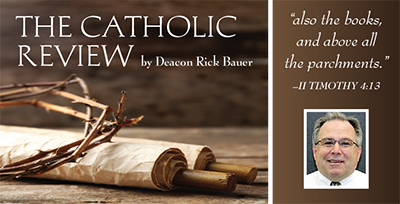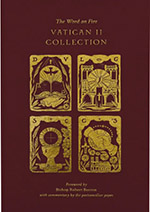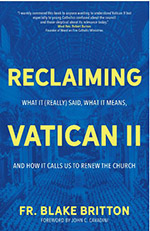THE CATHOLIC REVIEW: Vatican II at 60: A Returning Pilgrim’s Perspective
by Deacon Rick Bauer

During a Mass celebrating the 60th anniversary of the opening of the Second Vatican Council, Pope Francis observed, “If [the Church] should fail to rejoice, she would deny her very self, for she would forget the love that begot her,” he said. “Yet how many of us are unable to live the faith with joy, without grumbling and criticizing? A Church in love with Jesus has no time for quarrels, gossip and disputes. May God free us from being critical and intolerant, harsh and angry!”
Michael Sean Winters, writer at the National Catholic Reporter, observed recently that “Sixty years is a long time — except in the life of the church. It takes 100 years to receive a council . . . [Pope] Francis has brought the fruits of the council that ripened in Latin America to the center of the universal church, just as Popes Paul VI, John Paul II and Benedict XVI brought their gifts to bear on the reception of the council. Francis has also reinvigorated the post-conciliar church with fresh insights and perspectives.”
The Second Vatican Council (1962–1965) was a gathering of Catholic bishops from around the world, and was probably one of the most significant cultural and ecclesiastical events of the twentieth century. While most Catholics recognize its significance, we have been debating its precise meaning and application for the past 60 years.
On the one hand are “radical traditionalists” who claim that Vatican II has betrayed authentic Catholicism and produced disastrous consequences in the life of the Church; on the other, “progressives” who saw the council documents as a first step in the direction of a more radical reform of the Church, perpetuating the “spirit” of Vatican II.
As a young biblical scholar, the documents of Vatican II were instrumental in my returning to the Catholic faith after years of abandonment. Growing up in Central and South America, it was disconcerting to my fully-Catholic family to hear about violent revolution and armed conflict, inspired by so-called “Liberation Theology,” that some saw as the fruit of Vatican II, and my family left the Catholic Church. As a teen, I did not consider any alternative but to follow. It would take years, but while in graduate school I encountered “Dei Verbum,” the council’s Dogmatic Constitution on Divine Revelation, for the first time. It rocked this young Protestant clergyman’s world. Along with the nature of the Eucharist, Vatican II would propel my return to the Catholic faith.
How do we today reckon with the undeniable impact of Vatican II? First, ad fontes, to the sources! Though church historians or theologians will pore through the complete library of Vatican II publications, (of which there are many wonderful choices) interested Catholics may find their time limited, but nonetheless desire more insight.
 A wonderful, well-fashioned keepsake is the “Vatican II Collection,” edited by Matthew Levering with a foreword and commentary by Bishop Robert Barron of Word on Fire Ministries (Word on Fire Institute, 2021, 392 pages, hardcover). Bishop Barron selected the four major documents of the council — Dei Verbum; “Lumen Gentium,” the Dogmatic Constitution on the Church; “Sacrosanctum Concilium,” the Constitution on the Sacred Liturgy; and “Gaudium et Spes,” the Pastoral Constitution on the Church in the Modern World. In addition to these four major works of the council, we can read the opening address by Pope John XXIII, the closing address by (then-new) Pope Paul VI, along with several helpful indices.
A wonderful, well-fashioned keepsake is the “Vatican II Collection,” edited by Matthew Levering with a foreword and commentary by Bishop Robert Barron of Word on Fire Ministries (Word on Fire Institute, 2021, 392 pages, hardcover). Bishop Barron selected the four major documents of the council — Dei Verbum; “Lumen Gentium,” the Dogmatic Constitution on the Church; “Sacrosanctum Concilium,” the Constitution on the Sacred Liturgy; and “Gaudium et Spes,” the Pastoral Constitution on the Church in the Modern World. In addition to these four major works of the council, we can read the opening address by Pope John XXIII, the closing address by (then-new) Pope Paul VI, along with several helpful indices.
Along with the sources, there have been entire libraries of good analysis, histories, and theological works covering various aspects of Vatican II, far too many to mention. Since I have the deep joy to be entrusted with serving as your book review editor, I offer below some of the major thought-provoking books it has been my pleasure to recommend over the years. There is not enough time or space to detail them all, but all of them would be a worthy addition to personal or parish library, and to all our religious and theological knowledge. May God bless you as you review this church-changing council!
• “Vatican II: The Battle for Meaning, by Massimo Faggioli (Paulist Press, 2012, 200 pages, paper). An insightful and credentialled survey of the major events during the council. Faggioli attempts to go beyond the lengthy “class of interpretations” viewpoint that others have extensively covered already, and was one of the more coherent attempts to see Vatican II in continuity of the traditions of Catholicism. There is a short chapter on the history of the major post-conciliar debates as well. This short book is required reading in many seminaries on the history of Vatican II and its significance.
• “The Legacy of Vatican II,” edited by Massimo Faggioli and Andrea Vicini (Paulist Press, 2015, 312 pages, paper). This is a celebration and study of the significance of Vatican II, written by four Jesuit theologians at the council — Cardinal Augustin Bea, Henri de Lubac, Otto Semmelroth, and John Courtney Murray, along with 12 international scholars. Chapters are grouped along themes of “Continuity and change in Vatican II”; “Engagements: The Council and the Public Arena”; and “Figures: The Jesuits and Vatican II.”
• “Ressourcement After Vatican II: Essays in Honor of Father Joseph Fessio, S.J.” edited by Nicholas Healy and Matthew Levering (Ignatius Press, 2019, 379 pages, cloth). For those seeking a deeper dive into the interpretation of scripture and development of doctrine (admittedly personal favorites), this book (dedicated to Jesuit Father Joseph Fessio, the founder of Ignatius Press) is a treasure of insight, including some works translated into English for the first time.
The ressourcement movement ignited by Vatican II involved a return to the authoritative sources of Christian faith, for the purpose of rediscovering their truth and meaning in order to meet the critical challenges of our time.
 What if the entire traditional/progressive response to Vatican II is wrong? Have Catholics — both those who embrace the spirit of Vatican II and those who regard it with suspicion — misunderstood what the council was really about?
What if the entire traditional/progressive response to Vatican II is wrong? Have Catholics — both those who embrace the spirit of Vatican II and those who regard it with suspicion — misunderstood what the council was really about?
Father Blake Britton came to value the truth and beauty of the council while he was in seminary, and he has witnessed firsthand the power of its teachings in the life of his own parish. In “Reclaiming Vatican II” — a partnership between Ave Maria Press and Word on Fire Catholic Ministries — Britton presses beyond the political narrative foisted upon the post-conciliar Church and contends that Vatican II was neither conservative nor liberal, but something much more beautiful and challenging.
Britton clears up misconceptions about the council and reveals how — when properly understood and applied — it fosters a richer experience of being in the Church. Britton says Vatican II promotes a return to the understanding of the Church Fathers and the Scriptures, holding both a commitment to tradition and the need for constant renewal in life-giving balance, recenters the Church on sacred liturgy and encourages both active participation and genuine encounter with transcendence, and charts a clear path for the Church’s renewal and empowers it for evangelism and transformative engagement with the world. Firmly rooted in the church’s history, it does not prescribe untried fads or difference for its own sake—some of the admitted difficulties of the early years after the council.
Britton invites all Catholics to step beyond the polarization and embrace Vatican II as one of our greatest resources for being in the Church in a way that is faithful, engaged, and effective if we answer its radical call to worship and renewal. “Reclaiming Vatican II” is a good book for the pastoral applications of the teachings of Vatican II.
1376